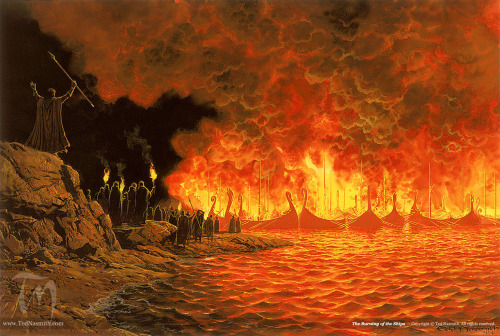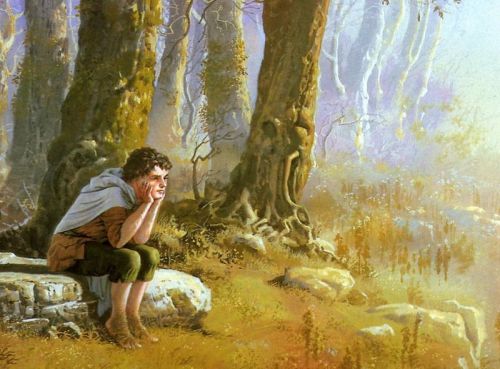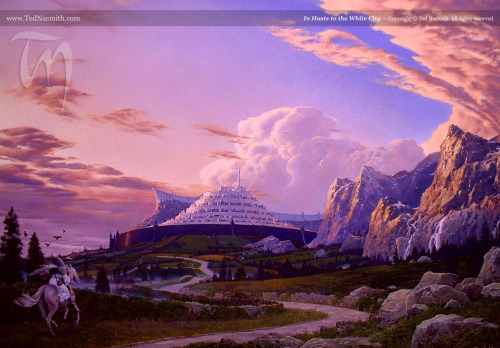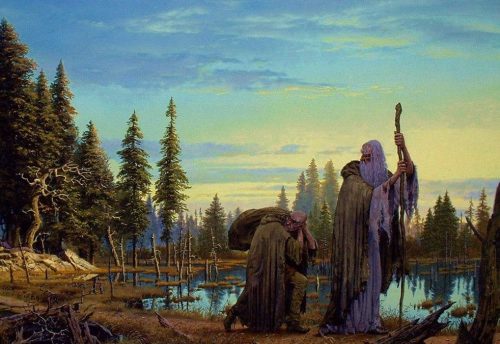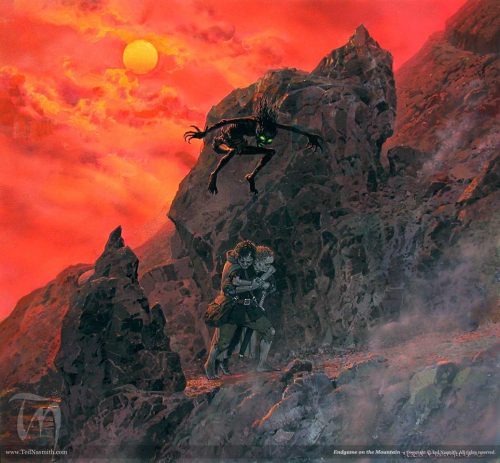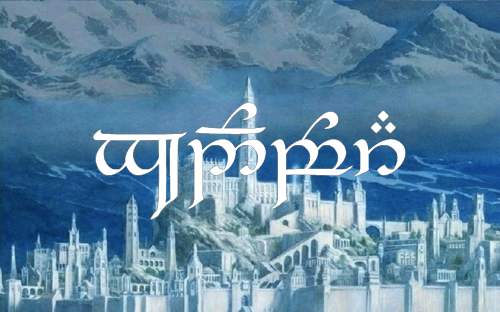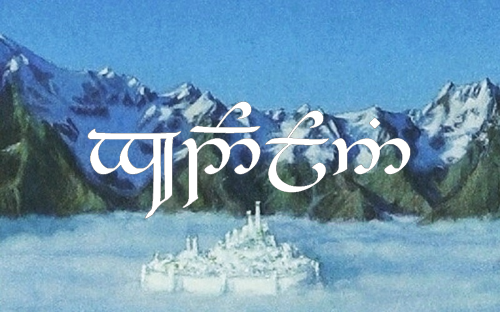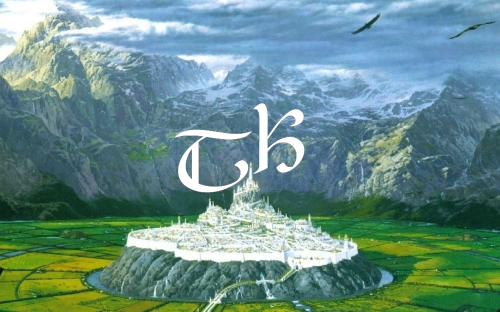#ted nasmith
The Burning of the Ships; art by Ted Nasmith
But when they were landed, Maedhros the eldest of his sons, and on a time the friend of Fingon ere Morgoth’s lies came between, spoke to Fëanor, saying: ‘Now what ships and rowers will you spare to return, and whom shall they bear hither first? Fingon the valiant?’
Then Fëanor laughed as one fey, and he cried: ‘None and none! What I have left behind I count now no loss; needless baggage on the road it has proved. Let those that cursed my name, curse me still, and whine their way back to the cages of the Valar! Let the ships burn!’ Then Maedhros alone stood aside, but Fëanor caused fire to be set to the white ships of the Teleri. So in that place which was called Losgar at the outlet of the Firth of Drengist ended the fairest vessels that ever sailed the sea, in a great burning, bright and terrible. And Fingolfin and his people saw the light afar off, red beneath the clouds; and they knew that they were betrayed. This was the firstfruits of the Kinslaying and the Doom of the Noldor.
— J.R.R. Tolkien, The Silmarillion, “Of the Flight of the Noldor”
Post link
“Frodo undertook his quest out of love–to save the world he knew from disaster at his own expense, if he could; and also in complete humility, acknowledging that he was wholly inadequate to the task. His real contract was only to do what he could, to try to find a way, and to go as far on the road as his strength of mind and body allowed. He did that. I do not myself see that the breaking of his mind and will under demonic pressure after torment was any more a moral failure than the breaking of his body would have been–say by being strangled by Gollum, or crushed by a falling rock.
That appears to have been the judgement of Gandalf and Aragorn and of all who learned the full story of his journey. Certainly nothing would be concealed by Frodo! But what Frodo himself felt about the events is quite another matter.
He appears at first to have had no sense of guilt; he was restored to sanity and peace. But then he thought that he had given his life in sacrifice: he expected to die very soon. But he did not, and one can observe the disquiet growing in him. Arwen was the first to observe the signs, and gave him her jewel for comfort, and thought of a way of healing him. Slowly he fades ‘out of the picture’, saying and doing less and less. I think it is clear on reflection to an attentive reader that when his dark times came upon him and he was conscious of being 'wounded by knife sting and tooth and a long burden’ it was not only nightmare memories of past horrors that afflicted him, but also unreasoning self-reproach: he saw himself and all that he [had] done as a broken failure. 'Though I may come to the Shire, it will not seem the same, for I shall not be the same.’ That was actually a temptation out of the Dark, a last flicker of pride: desire to have returned as a 'hero’, not content with being a mere instrument of good. And it was mixed with another temptation, blacker and yet (in a sense) more merited, for however that may be explained, he had not in fact cast away the Ring by a voluntary act: he was tempted to regret its destruction, and still to desire it. 'It is gone for ever, and now all is dark and empty’, he said as he wakened from his sickness in 1420.
'Alas! there are some wounds that cannot be wholly cured,’ said Gandalf–not in Middle-earth. Frodo was sent or allowed to pass over the Sea to heal him–if that could be done, before he died. He would have eventually to 'pass away’: no mortal could, or can, abide for ever on earth, or within Time. So he went to both a purgatory and to a reward, for a while: a period of reflection and peace and a gaining of a truer understanding of his position in littleness and in greatness, spent still in Time amid the natural beauty of 'Arda Unmarred’, the Earth unspoiled by evil.”
—J.R.R. Tolkien, The Letters of J.R.R. Tolkien, “246” (Part of his reply to a reader’s comments on Frodo’s failure to surrender the Ring in the Cracks of Doom)
Post link
Turning back they saw across the River the far hills kindled. Day leaped into the sky. The red rim of the sun rose over the shoulders of the dark land. Before them in the West the world lay still, formless and grey; but even as they looked, the shadows of night melted, the colours of the waking earth returned: green flowed over the wide meads of Rohan; the white mists shimmered in the watervales; and far off to the left, thirty leagues or more, blue and purple stood the White Mountains, rising into peaks of jet, tipped with glimmering snows, flushed with the rose of morning.
‘Gondor! Gondor!’ cried Aragorn. 'Would that I looked on you again in happier hour! Not yet does my road lie southward to your bright streams.
Gondor! Gondor, between the Mountains and the Sea!
West Wind blew there; the light upon the Silver Tree
Fell like bright rain in gardens of the Kings of old.
O proud walls! White towers! O winged crown and throne of gold!
O Gondor, Gondor! Shall Men behold the Silver Tree,
Or West Wind blow again between the Mountains and the Sea?
Post link
The hobbits of the villages had seen Saruman come out of one of the huts, and at once they came crowding up to the door of Bag End. When they heard Frodo’s command, they murmured angrily:
‘Don’t let him go! Kill him! He’s a villain and a murderer. Kill him!’
Saruman looked round at their hostile faces and smiled. 'Kill him!’ he mocked. 'Kill him, if you think there are enough of you, my brave hobbits!’ He drew himself up and stared at them darkly with his black eyes. 'But do not think that when I lost all my goods I lost all my power! Whoever strikes me shall be accursed. And if my blood stains the Shire, it shall wither and never again be healed.’
The hobbits recoiled. But Frodo said: 'Do not believe him! He has lost all power, save his voice that can still daunt you and deceive you, if you let it. But I will not have him slain. It is useless to meet revenge with revenge: it will heal nothing. Go, Saruman, by the speediest way!’
'Worm! Worm!’ Saruman called; and out of a nearby hut came Wormtongue, crawling, almost like a dog. 'To the road again, Worm!’ said Saruman. 'These fine fellows and lordlings are turning us adrift again. Come along!’
Saruman turned to go, and Wormtongue shuffled after him. But even as Saruman passed close to Frodo a knife flashed in his hand, and he stabbed swiftly. The blade turned on the hidden mail-coat and snapped. A dozen hobbits, led by Sam, leaped forward with a cry and flung the villain to the ground. Sam drew his sword.
'No, Sam!’ said Frodo. 'Do not kill him even now. For he has not hurt me. And in any case I do not wish him to be slain in this evil mood. He was great once, of a noble kind that we should not dare to raise our hands against. He is fallen, and his cure is beyond us; but I would still spare him, in the hope that he may find it.’
Saruman rose to his feet, and stared at Frodo. There was a strange look in his eyes of mingled wonder and respect and hatred. 'You have grown, Halfling,’ he said. 'Yes, you have grown very much. You are wise, and cruel. You have robbed my revenge of sweetness, and now I must go hence in bitterness, in debt to your mercy. I hate it and you! Well, I go and I will trouble you no more. But do not expect me to wish you health and long life. You will have neither. But that is not my doing. I merely foretell.’
–J.R.R. Tolkien, The Lord of the Rings: The Return of the King, “The Scouring of the Shire”
Post link
Endgame on the Mountain; art by Ted Nasmith
Again he lifted Frodo and drew his hands down to his own breast, letting his master’s legs dangle. Then he bowed his head and struggled off along the climbing road….Panting under his load Sam turned the bend; and even as he did so, out of the corner of his eye, he had a glimpse of something falling from the crag, like a small piece of black stone that had toppled off as he passed.
A sudden weight smote him and he crashed forward, tearing the backs of his hands that still clasped his master’s. Then he knew what had happened, for above him as he lay he heard a hated voice.
‘Wicked masster!’ it hissed. ‘Wicked masster cheats us; cheats Sméagol, gollum. He musstn’t go that way. He musstn’t hurt Preciouss. Give it to Sméagol, yess, give it to us! Give it to uss!’
J.R.R. Tolkien, The Return of the King, “Mount Doom”
Post link
“By the command of Morgoth the Orcs with great labour gathered all the bodies of those who had fallen in the great battle, and all their harness and weapons, and piled them in a great mound in the midst of Anfauglith; and it was like a hill that could be seen from afar. Haudh-en-Ndengin the Elves named it, the Hill of Slain, and Haudh-en-Nirnaeth, the Hill of Tears. But grass came there and grew again long and green upon that hill, alone in all the desert that Morgoth made; and no creature of Morgoth trod thereafter upon the earth beneath which the swords of the Eldar and the Edain crumbled into rust.”
Artwork by Ted Nasmith
Post link



Look at the gem that arrived yesterday

Sirion’s emergence from beneath the Andram
The Gates of Sirion was the cavernous mouth in the southern hills of the Andram where the River Sirion emerged from its underground course. The Gates were located three leagues southward of the Falls of Sirion where the river plunged below the Andram south of the Aelin-uial.
The City of Seven Names
Gondobar am I called and Gondothlimbar, City of Stone and City of the Dwellers in Stone; Gondolin the Stone of Song and Gwarestrin am I named, the Tower of the Guard, Gar Thurion or the Secret Place, for I am hidden from the eyes of Melko; but they who love me most greatly call me Loth, for like a flower am I, even Lothengriol the flower that blooms on the plain. — The Book of Lost Tales
Paintings by Alan Lee, Ted Nasmith, Luca Michelucci, Sarka Skorpikova, and J.R.R. Tolkien
Post link

